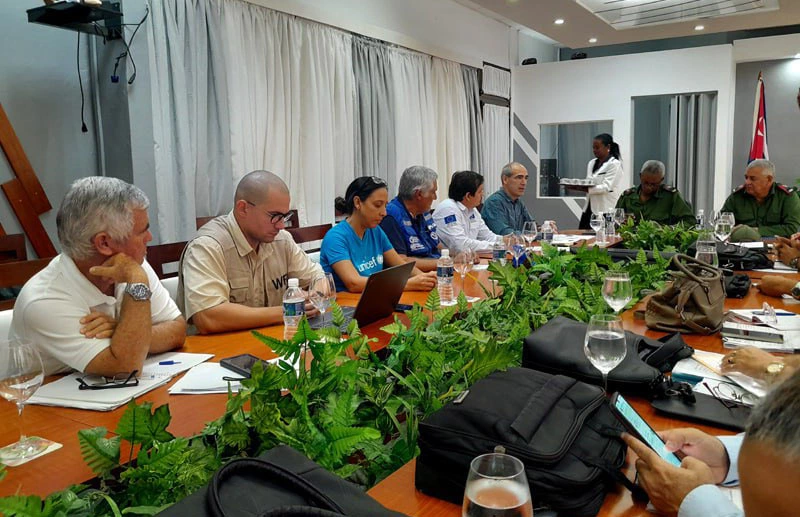The solidarity efforts for the recovery of essential areas such as water, health, education, and food, following Hurricane Melissa, are the focus of today’s dialogue between representatives of the United Nations (UN) System in Cuba and the Holguin Provincial Defense Council (CDP).
With the aim of supporting the eastern territories affected by the hydrometeorological evento. The meeting held at the provincial government included members of three UN agencies based in the country—the World Food Programme (WFP), the United Nations Children’s Fund (UNICEF), and the World Health Organization (WHO)—along with guests from the European Union.
Sergio Novás Tejero, UN Development Partnerships and Financing Officer, explained that Cuba is implementing a comprehensive action plan to support 33 eastern municipalities impacted by Hurricane Melissa. 11 of which are located in Holguin province and were directly in the path of the storm’s eye.
In Holguin, the areas most affected by flooding and strong winds from Hurricane Melissa are Urbano Noris, Cacocum, Cueto, and Sagua de Tanamo. Throughout the province, more than 20,000 homes have been damaged. There has been significant economic impact. However, no loss of life has been reported, according to Joel Queipo Ruiz, president of the Provincial Defense Council (CDP).
Immediate priorities include restoring the electrical grid, which has service to 86 percent of customers. Also the recovery of agriculture, with more than 22,000 hectares of land affected, primarily cassava and coffee crops. Regarding food and nutritional security, Rolando Verdes Sánchez, a member of the WFP emergency team, explained that their work focuses on leading the logistics sector through donations of non-food items and the distribution of basic products such as rice, grains, and oil. Which will assist more than 900,000 people in eastern Cuba over six months.
Ángela Peña, UNICEF’s Monitoring and Evaluation Officer in Cuba, commented that, as part of the response plan, they are leading support in the areas of water, hygiene, and sanitation, particularly in schools, families, and communities. She emphasized the importance of assessing the damage and resources needed to optimize the organization’s cooperation.
For his part, Luis Felipe Batista Rodríguez, head of the Education subgroup, indicated that, with more than 500 schools still affected, primarily in terms of roofs and coverings, they are implementing alternatives aimed at reorganizing the teaching process. He also expressed his gratitude for UNICEF’s contribution of psycho-emotional support kits for children.
Duniesky Cintra, a consultant for the WHO and the Pan American Health Organization in Cuba, highlighted the support provided by these entities in preparing for and responding to health emergencies. With an emphasis on medical assistance and access to water. He reiterated their support for arbovirus prevention efforts through the distribution of supplies such as repellents, fumigation equipment, and mosquito nets.
Noel Sampson, an official with DG ECHO, the European Commission’s agency for humanitarian aid in disaster situations, affirmed that they will continue mobilizing resources to finance the response to Hurricane Melissa in the affected countries, including Jamaica and Haiti.
In Cuba, cooperation among United Nations agencies following the impact of Melissa also involves the United Nations Development Programme (UNDP). The International Organization for Migration (IOM), and the Food and Agriculture Organization of the United Nations (FAO).
With information from Prensa Latina
- Holguin Expands Scientific Reserve Programs - 10 de January de 2026
- Challenges and Opportunities for the Cuban Press in the Face of AI - 10 de January de 2026
- Cuba Seeks to Secure Energy Cooperation with Mexico - 10 de January de 2026

